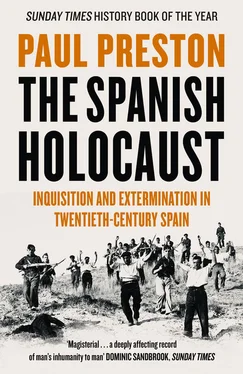To take charge of the process, Queipo de Llano chose an Africanista, the infantry Captain Manuel Díaz Criado. He had served with the Foreign Legion in the 1920s and organized the Guardiá Cívica that murdered four workers in the Parque de María Luisa in Seville in 1931; he had also been involved in Carlavilla’s attempt to murder Azaña in May 1936. On 25 July, Queipo gave Díaz Criado the title of Military Delegate for Andalusia and Extremadura with the power of life and death over the people of the region. He chose as his right-hand man an equally brutal Civil Guard, Sergeant Major José Rebollo Montiel. Rebollo supervised the torture and interrogation of prisoners. Díaz Criado was described by Edmundo Barbero as ‘a cruel and sadistic drunk’. 48On his orders, the working-class districts of Triana and La Macarena were stripped of their male populations. Among hundreds of prisoners taken and herded into the provincial prison were children and old men. Most were quickly taken out and shot without any pretence of judicial procedure. Others were taken to rot in the fetid prison ship Cabo Carvoeiro. 49
When working-class leaders could not be found, members of their families were taken as hostages. The Communist leader of the Seville dockworkers, Saturnino Barneto Atienza, went into hiding and eventually reached the Republican zone. His sister, his wife, his infant daughter and his mother-in-law were detained in inhuman conditions for the duration of the war. His seventy-two-year-old mother, Isabel Atienza, a devout Catholic, was arrested and interrogated. On 8 October, she was forced to witness a shooting in the cemetery and then, seriously disturbed, was taken to a square near her home and shot. Her body was left in the street for a day. 50On the night of 10 August, a number of murders were committed to commemorate the anniversary of General Sanjurjo’s failed military coup in 1932. Among the victims were the Andalusian intellectual Blas Infante and the Republican Mayor José González Fernández de Labandera, who had helped foil the Sanjurjada.
Queipo de Llano gave Díaz Criado unlimited powers and would hear no complaints against him. Díaz Criado himself refused to be bothered by details concerning the innocence or previous good deeds of his victims. On 12 August, the local press was issued a note prohibiting intercessions in favour of those arrested. It stated that ‘not only those who oppose our cause, but also those who support them or speak up for them will be regarded as enemies’. 51Díaz Criado was widely regarded as a degenerate who used his position to satisfy his bloodlust, to get rich and for sexual gratification. The head of Queipo’s propaganda apparatus, Antonio Bahamonde, whose disgust at what he witnessed eventually led to his defection, was appalled by Díaz Criado. He wrote:
Criado usually arrived around six in the evening. In an hour or less, he would go through the files, signing death sentences (about sixty per day) usually without hearing the accused. To anaesthetize his conscience or for whatever reason, he was always drunk. As dawn broke every day, he was to be seen, surrounded by his courtiers in the restaurant of the Pasaje del Duque, where he dined every night. He was an habitual client of the night clubs where he could be seen with admiring friends, flamenco singers and dancers, sad women trying to appear gay. He used to say that, once started, it was all the same to him to sign one hundred or three hundred death sentences and the important thing was to ‘cleanse Spain of Marxists’. I have heard him say: ‘Here, for decades to come, no one will dare move.’ He did not receive visits; only young women were allowed into his office. I know cases of women who saved their loved ones by submitting to his demands. 52
Francisco Gonzálbez Ruiz, one-time Civil Governor of Murcia, had similar recollections of Díaz Criado: ‘in the small hours, after an orgy, still accompanied by prostitutes, and with unimaginable sadism, he would haphazardly apply his fateful mark “X2” to the files of those who were thus condemned to immediate execution’. 53One of Díaz Criado’s closest friends was a prostitute known as Doña Mariquita who had hidden him when he was on the run after his attempt to kill Azaña. Knowing this, many people paid her to intercede for their loved ones. Edmundo Barbero was present at gatherings in the early hours of the morning at which Díaz Criado, Sergeant Rebollo and Doña Mariquita would discuss the sexual and financial offers made on behalf of prisoners. On one such occasion, a bored Díaz Criado decided to take those present to a dawn execution. To his irritation, they arrived just as the echoes of the shots were dying away. However, he was mollified when the commander of the firing squad offered the women of the party his gun for them to finish off the dying. A sergeant of the Regulares then proceeded to remove gold teeth from the dead by bashing their heads with a stone. 54
Bahamonde saw Díaz Criado drunk in a bar, signing death sentences. One of the few who survived to tell the tale later was the last Republican Civil Governor of Seville, José María Varela Rendueles. Díaz Criado began his interrogation with the words: ‘I have to say that I regret that you have not yet been shot. I would like to see your family in mourning.’ He said the same to Varela Rendueles’s mother some days later. Díaz Criado falsely accused Varela Rendueles of distributing arms to the workers. The only ‘proof’ that he could produce was a pistol once known to have been in Varela Rendueles’s possession found on a worker shot resisting the coup. The pistol had been stolen when Varela Rendueles’s office was looted. However, only after his successor as Civil Governor, Pedro Parias, had corroborated this did Díaz Criado grudgingly withdraw the accusation. 55Díaz Criado’s slipshod manner inevitably led to problems.
According to the usually reliable Bahamonde, ‘A friend of General Mola was shot, despite the fact that Mola himself had taken a great interest in his case, even telephoning Díaz Criado personally. Since he usually just signed the death sentences after barely flicking through the files, Díaz Criado failed to notice that on the day in question he had signed the death sentence of Mola’s friend.’ 56Even so, Queipo tolerated Díaz Criado’s excesses; but, in mid-November 1936, Franco himself insisted on his removal. The immediate trigger had been that he had accused the Portuguese Vice-Consul in Seville, Alberto Magno Rodrigues, of espionage. Given the scale of Portuguese help to the rebel cause, and the efforts of Salazar’s government to secure international recognition for Franco, the accusation was acutely embarrassing. Moreover, it was absurd since Rodrigues was actually compiling information about German and Italian arms deliveries at the request of Franco’s brother, Nicolás. An enraged Queipo de Llano was forced to apologize to Rodrigues in front of Nicolás Franco. Now known as the ‘Caudillo’, Franco personally signed Díaz Criado’s posting to the Legion on the Madrid front, where he employed his brutal temperament against the soldiers under his command. 57
Díaz Criado’s replacement by the Civil Guard Major Santiago Garrigós Bernabéu brought little relief to the terrorized population. Indeed, it was fatal for those who had been saved by the bribery of Doña Mariquita or by sexual submission to Díaz Criado himself. Francisco Gonzálbez Ruiz commented on the situation: ‘since some fortunate ones were saved by the opportune intervention of a female friend or by dint of paying a goodly sum, of course, when Díaz Criado was sacked, his successor felt the need to review the cases. Because the procedure followed had been corrupt, those who had been freed were now shot. Needless to say, nothing could help the thousands of innocents already dead.’ 58
Читать дальше












